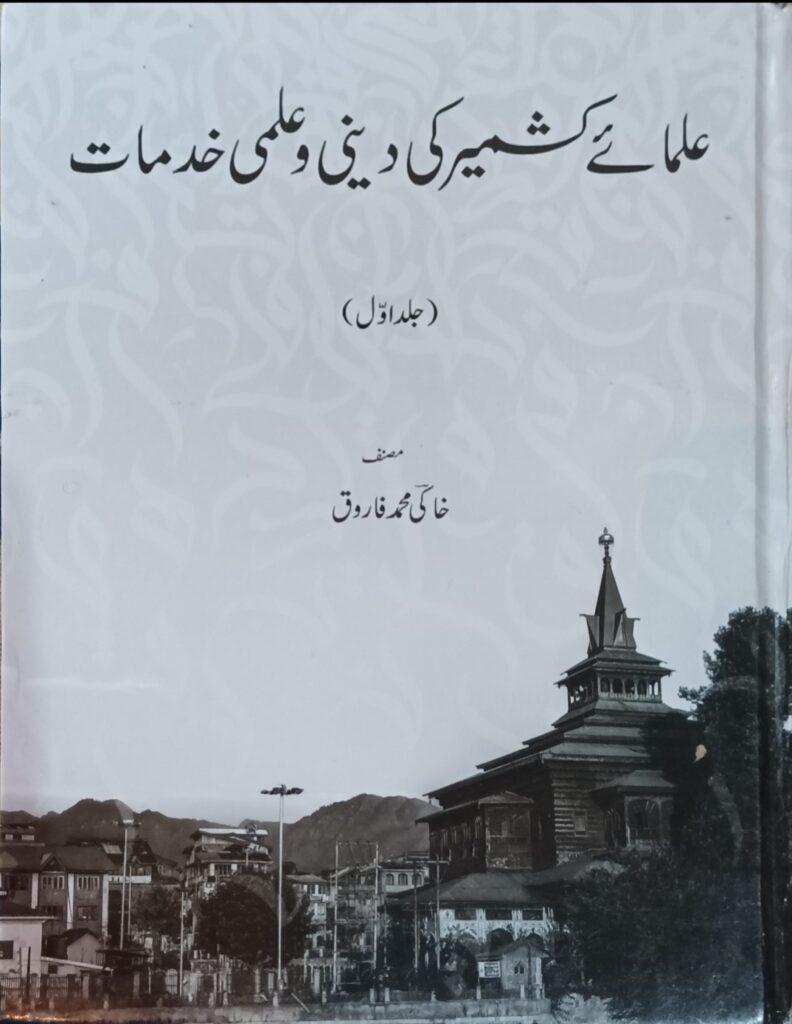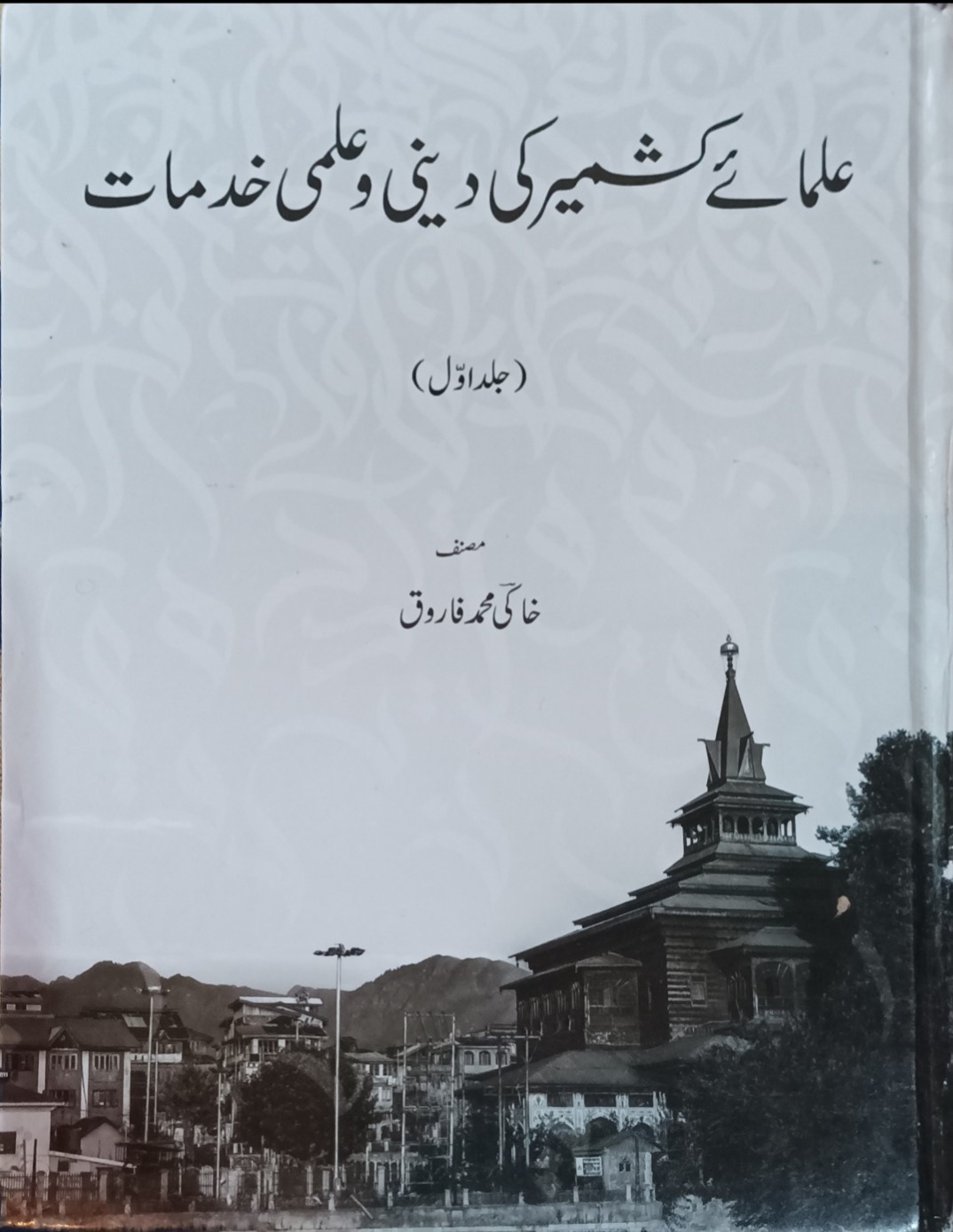Khaki Mohd Farooq’s latest offering, “Ulmai Kashmir Ki Deeni Wa Almi Khidmaat,” transcends the picturesque beauty of the Valley of Kashmir. With meticulous detail, this book unfurls the lives of key figures—Hazrat Ab Rehman Bulbul, Mir Syed Ali Hamadani, and more—who paved the way for a Muslim-majority Kashmir. An indispensable read for those seeking to fathom the intricacies of Kashmir’s spiritual journey.
By Rayees Ahmad Kumar
Kashmir Valley, renowned worldwide for its captivating beauty, mesmerizing climate, and lofty snow-covered mountains, stands as a testament to the allure of nature. This region, with its vast green meadows and pristine water bodies, attracts visitors from every corner of the globe throughout the year, each season offering a unique charm for vacationers. However, beyond its natural splendor, the valley is also steeped in a rich religious and cultural history.
It serves as the abode for thousands of saints, whose noble teachings have resonated across the globe. From the farthest reaches of the world, these spiritual leaders have journeyed to Kashmir, preaching the tenets of Islam. It is due to their unwavering efforts that the Valley stands today as a Muslim-majority region within the country. Some historical accounts even suggest that companions of the Prophet SAW ventured here during his blessed period to disseminate the fragrance of Islam.
Amid differing historical perspectives, the recently released book “Ulmai Kashmir Ki Deeni Wa Almi Khidmaat,” authored by the esteemed Khaki Mohd Farooq, sheds light on the key figures who played pivotal roles in shaping the region’s religious landscape. Hailing from the Puhroo BK Pora area of Budgam district, Khaki Mohd Farooq, born in January 1973, is a distinguished scholar, author, poet, and preacher who has authored around two dozen books since 1998, primarily focused on Islamic studies.

The beauty of “Ulmai Kashmir Ki Deeni Wa Almi Khidmaat” lies not only in its comprehensive 570 pages but also in its unbiased portrayal of scholars and preachers from all schools of thought. The book meticulously covers the lives and works of 345 individuals who have significantly contributed to making the valley a Muslim-dominated region in India. Its cover, thoughtfully designed, and the superior quality of the paper inside add to its overall appeal.
The proem and forewords, penned by Khaki Umar Farooq, Moulana Ishaq Nazki, Dr Jawhar Qadosi, Dr Shakil Shifayi, and Khaki Mohd Farooq himself, provide insightful perspectives on the contents of the book. Khaki Mohd Farooq initiates the narrative with Hazrat Ab Rehman Bulbul, emphasizing his role as a great scholar and spiritual icon who traversed distant lands to propagate Islam in Kashmir.
The Book reasearches about the efforts of Mir Mohammed Hamdani, Sheikh Noor Din Noorani, and other prominent figures like Syed Janbaz Wali, Sheikh Hamza Makhdoom, Baba Dawood Khaki, Sheikh Yaqoob Sarfi, and Hazrat Baba Dawood Mishkati. The book captures their contributions, memorably chronicling their roles as scholars, mystics, and builders of mosques and religious institutions.
The book researches into the lives of various figures, such as Hazrat Syed Hussain Simnani, who spent two decades in Kulgam, and Mir Syed Ali Hamadani, the main architect of the Islamic revolution in the valley. Mir Syed Ali’s impact on society, not only in spreading Islamic teachings but also in imparting skills and crafts to make people economically self-reliant, is duly acknowledged.
The narrative continues with the efforts of Mir Mohammed Hamdani, Sheikh Noor Din Noorani, and other prominent figures like Syed Janbaz Wali, Sheikh Hamza Makhdoom, Baba Dawood Khaki, Sheikh Yaqoob Sarfi, and Hazrat Baba Dawood Mishkati. The book captures their contributions, memorably chronicling their roles as scholars, mystics, and builders of mosques and religious institutions.
Pir Hasan Shah Khoihami, recognized as a historian of the valley, receives due mention for his masterpiece, “Tarikhi Hasan,” contributing significantly to Kashmir’s historical narrative. The book’s comprehensive coverage extends to include various Islamic scholars, preachers, and religious personalities of all sectarian schools of thought, showcasing a diverse range of perspectives within the Islamic tradition.
“Ulmai Kashmir Ki Deeni Wa Almi Khidmaat” by Khaki Mohd Farooq stands as a valuable resource for those seeking an in-depth understanding of the individuals who shaped the religious landscape of the Kashmir Valley. Its meticulous documentation and inclusive approach make it a commendable contribution to the historical and religious literature of the region, providing readers with a nuanced perspective on the diverse tapestry of Islamic thought in Kashmir.

Leave a Reply